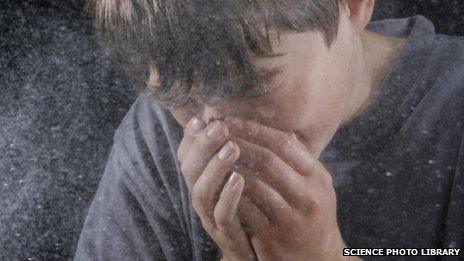Flu data to be collected from UK schools
- Published

Scientists are to begin collecting data on flu outbreaks from UK schools this winter to better understand its spread.
The Flusurvey, external surveillance project is in its fifth year, but for the first time classrooms are being asked to take part.
It coincides with the NHS beginning to roll out childhood flu vaccinations.
In time, the nasal spray vaccine will be available for children aged 16 and under.
This flu season it is being offered to all children aged two and three, as well as children of any age with long-term health conditions such as diabetes.
In Scotland and seven pilot areas in England, children aged four to 11 will also be eligible for it this year.
In order to help control and lower the impact of flu, the Flusurvey researchers from the London School of Hygiene & Tropical Medicine want to understand what role children play in catching and spreading the disease.
Exercise and diet
In 2012-13, the highest rates of infection were reported in the under-18 age group.
Head of the project Dr Alma Adler said: "Last year we found that taking public transport does not increase your risk of catching flu and we discovered that 'man flu' didn't really exist - in fact women were slightly more likely to report feeling worse when they have flu than men.

There are two main types that cause infection: influenza A and influenza B.
"This year we're keen to find out more about children because they are the 'key spreaders' of flu."
The Flusurvey team will be working with the British Science Association to link up with schools for the 2013-14 flu season to monitor the impact of the virus.
They will also be looking to see what role exercise and diet might play in keeping flu at bay.
Public Health England compiles its own weekly update on flu incidence rates.
Currently, there is no sign that the flu season has begun - GP consultant rates for flu-like illnesses have so far remained low throughout the UK.
Figures suggest a fifth of eligible two and three-year-olds have received their flu vaccine.
A third of eligible "at risk" adults and children, such as those with asthma, have been immunised, as have half of people in the over-65 age group.
A new vaccine is needed each year to protect against the flu viruses expected to be in circulation that winter and to boost the immune response.
Although influenza activity in the UK rose to only low levels in the 2012-13 season, activity was prolonged and reached levels higher than those seen in 2011-12.
If you have flu, you generally start to feel ill within a few days of being infected. Flu causes a sudden high temperature, headache, general aches and pains, tiredness and a sore throat. The symptoms are far more severe than with a common cold.
- Published30 October 2013
- Published11 October 2013